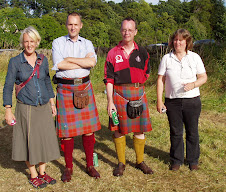Yesterday
was on the whole a success – at least, I didn’t slip backwards. Today I must
ensure that we have all we need for the weekend meals, so that I can take
tomorrow off and go walking with our niece. It’s been more than six months
since we last did this – it was in February, the day the Pope resigned. How much have I declined in that
time? We’re going to tackle the John
Muir Way
Our
Pathfinder guide says that we might see some red-breasted mergansers. I had to
look them up.
And then –
meals planned and supplies in – get back to the Shetland-fret.
The BSJ
progresses well. Another couple of sessions should polish it off. I grasped,
too late, that if I want to make it a little bit wider, in the hopes that it
wouldn’t pull out of shape when buttoned across the infant chest, the moment to
do it was just before the first column of buttonholes. That improvement – if it
is one – will have to wait for the next baby.
And then –
goodness! – what next? The Milano yarn should be here today. My mother was
advised once, when confronted with a multitude of tasks, to start with the one
that bugged her the most. That’s good advice. So I should perhaps tackle the
small, fiddly item I want to knit as a Christmas present – the one I will need
a sheet of acetate for; or go back to the Stephen West shawl, at least long
enough to get back in the saddle.
First, of
course, tidy and block Relax2.
Sally
Melville has published an
interesting rant about how knits need seams, for structure. Herzog – who
has an equally interesting post
about blocking “three-dimensional” knitting – would certainly agree.
There’s a whole new Craftsy class about seaming. All I need to do, for the
moment, is to practice mattress stitch, which I am keen to master anyway, and
get back to my Craftsy class with Franklin
Why don’t I
do it? Why does nothing get done?
Melville
says that knitting-in-the-round tends to skew in wear. She’s probably right.
Peasant knitting – fishermen’s ganseys, Fair Isle
– gains a good deal of structure from its dense fabric. And then EZ came along
and taught us all how much fun it was to knit around and avoid purling. But there is certainly a divide here, between Fashion Knitting and Peasant Knitting. The pendulum seems to be swinging back towards the former.
Melville
says that she has mastered purling with two colours (for Fair
Isle ). It sounds very awkward, and I have never enjoyed it in the
slightest. I would rather cut out a v-neck than knit back-and-forth. I’ve done
it, easily and successfuly. It might be a question to ask a
Shetland knitter if I meet any.
Non-knit
Lizzie
says: “ The
biggest sport here is basketball so I am looking forward to that starting, it
is so popular here that you have to get into groups and camp outside the
stadium for a whole week before the game in order to secure your tickets!
Normally it is done in groups of thirty and a rota is created for sitting out
between 8am-10pm everyday for a week!”
I didn’t go to a
single football game in high school or college, but I did go to basketball at
least once, and it was totally thrilling. “Stand up and cheer/ Cheer long and
loud for Asbury High School



Why not ask Kate Davis? She's the local expert in the history of Shetland knitting etc after all. She may well know.
ReplyDeleteBlue and black - is that a description of the players, when they come off the field?
ReplyDeleteI do agree that round and round knitting produces a spiral effect - subtler that in a lot of t-shirts etc, but that is because there are fewer stitches. I must be an oddity - I don't find purl a problem, and prefer the purl rows in colour knitting - I hold the yarns in my right hand and it is all in the angle of my wrist. At least, on the wrong side of the piece, I can see what my floats are up to.
Did you hear about the newest disaster in Jersey. The boardwalk and about 30 businesses in Seaside went up in flames yesterday. They survived the hurricane with moderaye damage and rebuilt. Now it is all gone. The big building in Asbury Park made it through the hurricane with minimum damage. '
ReplyDeleteLeslie in NJ
I would think that in places where there is stress that seams would add structure to a garment's fit, such as the armholes and shoulders. As for side seams, I don't know. I would think that a colorwork sweater by its nature would hold up well. I suppose it depends on the yarn -- the stickier, the firmer.
ReplyDeleteI 've purled in fair isle and had no issues. For me, I would rather purl that deal with a steek in many situations. I made a aran vest that is an EZ pattern and realized late that it was silly to have the steek. Given my yarn choose, llama, I would have been far better off to go back/forth. I do think side seams make a difference.
ReplyDeleteProbably choose based on project and purpose of the garment.
As has been said, "knitter's choice."
What a curious rant, I don't see one as "wrong" and another as "right", it depends on the situation. If you hold to that you end up with silly situations such as trying to knit socks flat or do a yoke sweater with at least 5 pieces and seams in silly places (as I have read in a pattern put out by a major British yarn company).
ReplyDeleteAs purl seems to have been invented a good while after knitting, doing things in pieces is really a modern phenomenon.
There is also the problem for those of us who aren't keen on sewing (and hence knit) and so tend to put off sewing together our sweaters almost indefinitely.
I'm a Shetlander and I would always knit fair isle in the round rather than purl(although I can do it). If I'm knitting a swatch I would join the wool at the start of the row and break it off at the end of each row to ensure the right side of the knitting is always facing me. You can instantly see how the patterns and colours are progressing. I always use a knitting belt.
ReplyDeleteEnjoy your trip to Shetland. Remember to visit the Textile museum at the Bod of Gremista in Lerwick. I was there earlier this week and there are some lovely items of knitwear on display and for sale.
I'm late to read and respond, but I just took a course from Stephanie Pearl-McPhee (Knitting for Speed & Efficiency) and she showed the class a purling technique from Peru that blew my mind. You wrap the yarn around your neck, like Sally Melville describes, which keeps the yarn in the front of your work. Stick the needle in the front of the stitch, then use your thumb (left thumb I think) to twitch the yarn around the needle. It turns out this is the way Peruvian knitters knit - completely in purl stitch, so that the inside of the work is what faces the knitter. Sally Melville must be throwing one color with her right hand, and Peruvian purling the second color with the thumb of her left hand.
ReplyDelete